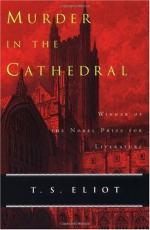
|
| Name: _________________________ | Period: ___________________ |
This test consists of 15 multiple choice questions and 5 short answer questions.
Multiple Choice Questions
1. What is another way Beckett refuses to define a martyr?
(a) Someone who does not desire anything for himself.
(b) An accident of chance.
(c) Someone who has lost his will to a higher one.
(d) Someone both mourned and celebrated.
2. Beckett asks the congregation to think about the meaning of what word?
(a) Sacrifice.
(b) War.
(c) Peace.
(d) God.
3. What are the words Beckett quotes from the Bible?
(a) "The Lord is My shepard, I shall not want; He makes me lie down in green pastures."
(b) "God bless us, every one."
(c) "Glory to God in the highest, and on earth peace to men of good will."
(d) "For God knows that in the day you eat from it your eyes will be opened, and you will be like God, knowing good and evil."
4. What is the best way to define the style in which T.S. Eliot wrote the Interlude?
(a) Dialogue
(b) Blank verse.
(c) Monologue
(d) Poetry
5. What would be the most likely reaction of the Canterbury people that this is Beckett's last sermon?
(a) Apathy and boredom.
(b) None of these.
(c) Happiness and celebration.
(d) Shock and confusion.
6. Looking at the clues in the Interlude, which Tempter proved to be the most successful?
(a) The Second.
(b) The First.
(c) The Third.
(d) The Fourth.
7. What is an effective speaking tool that Beckett uses in his speech?
(a) Repetition.
(b) Alliteration.
(c) Tears.
(d) Hyperbole.
8. What is one of the reasons Beckett would allow himself to be killed?
(a) For the glory of martyrdom.
(b) For revenge.
(c) To prove the King wrong.
(d) To aid in the salvation of man.
9. Why does Beckett believe the thought of the angels bringing peace is strange?
(a) The world has been struck by war.
(b) The angels ceased to appear
(c) No one listened to them.
(d) The world was already a happy place.
10. To Beckett, what is martyrdom?
(a) It is always the design of God.
(b) An act of chance.
(c) It is the result of cruel men.
(d) It is always a request of angels.
11. At what time of day does the sermon take place?
(a) Afternoon.
(b) Midnight.
(c) Morning.
(d) Evening.
12. What does Beckett see himself as, in reference to his definitions of martyrdom?
(a) A simple man.
(b) A brave man.
(c) A messenger.
(d) An instrument of God.
13. What is another way Beckett defines peace?
(a) The sleeping dog.
(b) The setting sun.
(c) The stillness of water.
(d) The swept hearth.
14. Which specific Canterbury martyr does Beckett ask the congregation to remember?
(a) John the Baptist.
(b) Archbishop Beckett.
(c) St. John the Apostle.
(d) Archbishop Elphage.
15. Which is NOT an adjective you might use to define Beckett's sermon?
(a) Ominous.
(b) Passionate.
(c) Accepting.
(d) Bitter.
Short Answer Questions
1. Whose idea is being echoed when Beckett talks of the promise of peace being "a disappointment and a cheat?"
2. What does Beckett believe about the peace that the world was promised?
3. What is the last word of the Interlude?
4. Why was the Tempter successful?
5. What would Beckett have the congregation do?
|
This section contains 557 words (approx. 2 pages at 300 words per page) |

|




